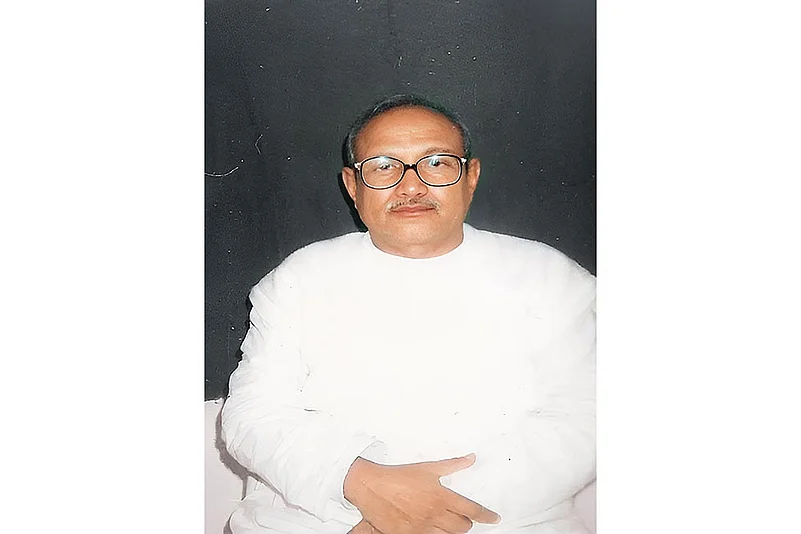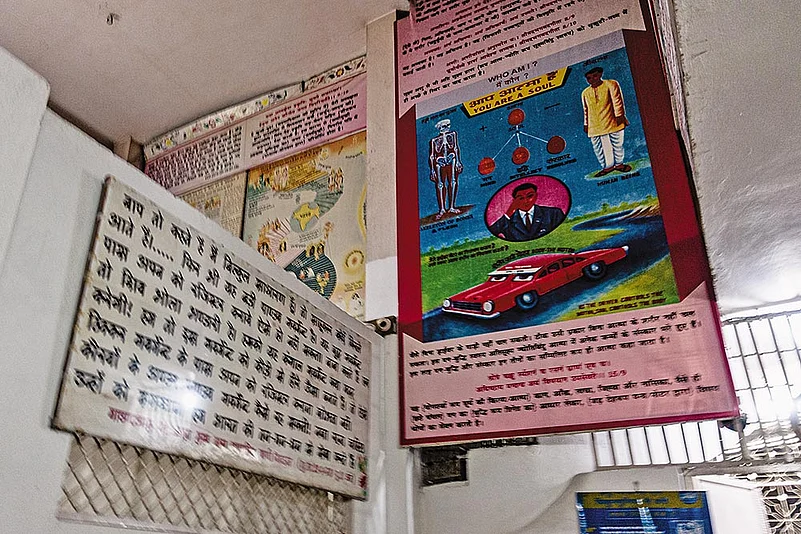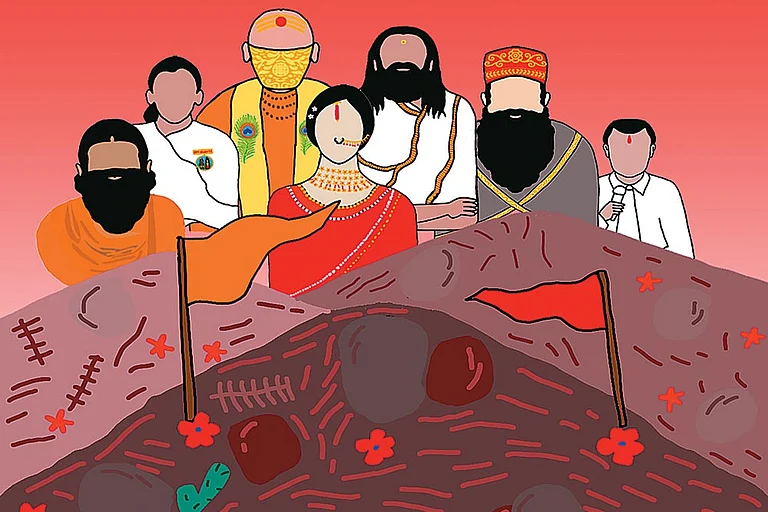The Adhyatmik Vishwa Vidyalaya ashram in Rohini in New Delhi is a fortress. The four-storey building houses 200 women and a dozen men, but no one can say for certain. Each window is blocked by thick iron bars and wrapped in blackout sheets. The roof, where the women might dry clothes, is obscured by thick green tarp. Outsiders aren’t allowed beyond the lobby, and AVV members don’t leave without escorts. The underground parking ensures that even during CBI raids—at least three in nine years—the neighbours would not know.
Years After Self-Styled Godman Virendra Dev Dixit Flees CBI, His Victims Contend With The Abuse They Suffered, And Inflicted
Neither light, nor outside air reaches the women trapped in Adhyatmik Vishwa Vidyalaya centres across India. Their guru is charged with human trafficking, but many remain

In a 2018 report filed before the Delhi High Court (DHC), former head of Delhi Commission for Women (DCW) Swati Maliwal said the ashram was a prison. Recent reports to DHC also say that the inspectors “observed/felt that in-group rules were binding on the girls and no one was willing to violate them.”
AVV is a sub-branch of the doomsday movement Brahma Kumaris (BKs.) The group’s followers call themselves the Advance Party or Prajapita Brahma Kumaris (PBKs.) Based in Kampila, Uttar Pradesh, AVV is headed by 82-year-old self-styled godman Virendra Dev Dixit. PBKs believe Dixit is a medium for Brahma Kumari leader Lekhraj Brahma. The AVV website describes him as a “poor Brahmin” who is “performing the task of establishing the Golden Age.”

Starting from his home in 1984, then with his child bride Kamla devi, Dixit amassed over 50,000 followers and AVV centres in every city of India. The godman has, however, been embroiled in controversy since 1998 when two girls from the Kampila ashram accused him of rape. The court dropped the cases after the survivors turned hostile. Then, in 2017, based on complaints from neighbours, DCW began investigating the Delhi-based AVV ashrams in Vijay Vihar, Nangloi, Karawal Nagar and Mohan Gardens. What it found shocked the nation.
Sex as Seva
In December 2017, Srivanitha was a 20-year-old who’d been living and working in AVV, an organisation claiming to impart spiritual teachings to their students, for two years. When AVV’s head, Dixit, called her to his suite to do seva (service), she thought nothing of it other than that she would have to serve him food, or massage his feet.
When the older women of the ashram took her to the floor where Dixit lived alone and apart from the rest of the building, she was taken aback that they locked her in. Still, she went to his bedroom when he called. “I believed he was like our father and so thought he wanted me to do seva like press his feet,” she said.

When Dixit tried to rape her, Srivanitha leapt away. She ran out of his room but she faced the suite’s locked main door. “I did not stop screaming until a woman came up the stairs, unlocked the door, and ran away without saying a word to me,” she said.
Srivanitha, who was so taken in by Dixit that she brought her brother and sister into the group, was not the first, nor the last. She left the ashram, but her brother is also a PBK follower.
At the time of the incident, DCW was investigating Dixit for human trafficking charges related to the AVV institute; 41 women had been rescued by the CBI from centres in Rohini and Mohan Garden. The DHC had given an order restraining his movements out of Delhi during the investigation. The incident happened in an AVV centre in Farrukhabad, Uttar Pradesh, just days after the High Court’s order, says Srivanitha.
“Present whatever evidence you want in front of the women who are inside—they won’t believe you, they won’t be moved by it.”
Blind Devotion, Abuse of Power
Dixit absconded nine years ago; the CBI issued a lookout notice on him. But even after numerous reports of abuse and raids at his ashrams, AVV followers flock towards them, leaving the authorities baffled.
“You can present whatever evidence you want in front of the women who are inside—they will not believe you, and they will not be moved by it,” says 40-year-old Prerna*, who escaped from an Anantpur-based ashram in 2021. Her certainty comes from experience, she adds. “Far from acknowledging the cases, I used to think ‘why are these women talking nonsense and spoiling their own mood,’” she explained.
Prerna surrendered herself in Farrukhabad in 2005. Her mother was a Dixit devotee, but did not want the 19-year-old BTech graduate from Andhra to go to an AVV ashram. But, having seen the satsangs and heard Dixit’s teachings her whole life, Prerna felt she wanted to dedicate her life to spiritual learning. On her first day in the ashram, senior women told her to meet Dixit, and he raped her, she said.
The next day, when she tried to leave, senior women in the ashram known as matas and didis depending on their marital status, gathered around her to stop her. “This was a test of your faith,” they told the teenager.

Jayati Kalra, a Delhi-based psychoanalyst who works with former cult members in her practice, says that understanding the motives of one individual in a cult does not give the full picture. “The question of what happens in these women’s minds needs to be reframed into what happens in these groups,” she said.
According to Kalra, the need to belong is primal for all human beings, but a cult is differentiated by the presence of a charismatic leader who offers some divine knowledge. Dixit promises the women deliverance from kalyug /world’s end, and the chance to be one of the chosen 16,108 who will repopulate the Earth. Cults also exercise coercive control over their members, says Kalra, adding that people are indoctrinated in a systematic manner.
When asked why she stayed 16 years after the rape, escaping in 2021, Prerna points to the fact that she was immediately transferred to Kampila after the incident, given responsibilities, and made in-charge of an ashram in Anantpur within the year. “Being made in-charge is special, you have a bit more control and more knowledge than the other women so I felt I would be protected now,” she said.
Kalra said this pattern of abuse and reward is the norm for cults. “There are rewards that come along the way—you do a good enough job being devoted, you can meet the leader, or be in charge of the centre, or control other members, and that can be a motivator to stay,” said Kalra.
Unbreakable Rules, Harsh Punishments
Cults also exercise control over its members in other ways as well—physical and psychological, Kalra says.
Within the ashrams, Prerna describes an atmosphere of paranoia, coercive control and abuse. “The atmosphere he creates is such that no one really shares anything with the person next to them or about what happened to them,” she said.
In an affidavit filed before DHC on January 29, Srivanitha described how, shrouded in secrecy, scared of their own shadows, the women are kept under control.
Those who surrender or are made to join AVV centres by family members have to submit an affidavit confirming they are virgins, or born-again virgins. Those who live in the ashrams aren’t allowed to marry, or speak to men and even each other outside of household matters such as cleaning and cooking. “Only women are surrendered in the ashram. Men can come and go as they please,” said Srivanitha.
Their day begins at two am, when they wake to perform ablutions and bathe. They serve Dixit and the senior women breakfast, do the washing and clean the ashram. The organisation divides the women in groups according to the task at hand–one group for cooking, another for cleaning toilets, etc.
“Every cult starts developing its rituals. The ritualisation solidifies a sense of belonging,” said Kalra.
Hardly is the women’s work done when hour-long lessons on spirituality start at 5 am, and then these lessons are repeated five times a day, every day.
“During these sessions, one gets swayed. It feels like you are so spiritual that even in a rock you can see God. I used to believe he was a god.”
“During these sessions, there is music, there are speeches, one gets swayed. It feels like you are so spiritual that even in a rock you can see God. I used to believe he was a god,” said 50-year-old Anna behen, who was one of Dixit’s first followers in his Kampila house.
According to Kalra, this is a systematic way to break down their defences. “When one joins, they are part of this outer circle and one goes to satsangs one meets other members and starts realising there is a hierarchy of members inside. Then, as they spend more time, they become closer to the leader and get access to something special—information in this case—then little by little, they are forced to believe ideas with nonstop bombardment of facts, supposed logic and confidence. This is done repeatedly over time—because it doesn’t happen in one go,” she explained.
Another tactic that contributes to his legend in AVV is Dixit’s insistence on confessional letters called Pota Mail. Every member writes down their confessions, which include carnal feelings or doubts they may have about their path at AVV on a weekly, sometimes daily, basis. “You have to write every small detail—the time, the place, your physical sensations even,” Prerna said. The Pota Mail allows Dixit to gain intimate knowledge of each member, which he would then use while speaking to them or giving talks (murli) in their ashrams. “People hear him say something relevant to their letter at the ashram and think, ‘Babaji knows all, he must be prophetic,” she said.
Anyone who questions the rules, or speaks up is called a vidrohi (rebels.) Within the ashram, vidrohis are ignored, removed from positions of power, and kept in a separate room. Should they manage to escape like Srivanitha or Prerna, no member of AVV will speak to them, even their own family. Srivanitha’s older brother remains a believer and will not eat any food she has prepared because, as a vidrohi, she’s a bad soul.
Out with the Old Baba, in with the New
On the outskirts of Delhi, a four-storey building in Palam houses a new AVV ashram. The ground floor and second floor are occupied by the ashram and young girls, who are followers of a new AVV sect started by Dixit’s former lawyer Amol Kokane. The doors of the third floor are fortified are by iron bars, echoing the Rohini ashram.
While not much is known about Kokane, he had joined AVV in 2005, and thereafter studied law. Thus far, the 44-year-old has only represented Dixit in cases before the DHC. He is internet-famous for calling women the doorways to hell–a remark that caused Justice Gita Mittal, before whom he was arguing Dixit’s case, to stop the hearing and ask him if he was, in fact, a lawyer.
It would appear that, upon Dixit fleeing from police, Kokane has taken over parts of AVV. In 2021, he declared himself an Ashtdev, supposedly one of eight angels who will lead people to salvation at the end of the world. In line with the Brahma Kumaris, AVV/PBK too believes the world will end in 2036, after which they will be chosen to repopulate the earth.
In January, 43-year-old Soumya* filed a writ before the DHC demanding to see her daughter who had turned 18 only two weeks before running away to the Palam ashram. Soumya claims the girl left her Coimbatore-home at Kokane’s encouragement. WhatsApp chats filed in court show Kokane chatting with the then-16-year-old girl, telling her: “I’m thinking of you… I’m coming to visit you, when are you coming meet me?” She alleges Kokane has been grooming her daughter since she was a minor. “He even had her record me while we were arguing about her involvement with this group so that later he could tell her how, point by point, I am wrong,” says Soumya.
However, Indian law fails victims here, says advocate Sneha Singh, a child rights lawyer who specialises in POCSO cases.
“Grooming isn’t defined anywhere in our criminal laws—the IT Act does not cover online grooming of children, unless it’s overtly sexual,” she said, adding that as per the Indian system, any grooming must be followed by sexual contact for it to be considered a crime.
Soumya got a court order allowing her visitation with her daughter for 45 minutes a day. The young girl was dressed in a sari, wore none of her jewellery as it had been surrendered to the ashram, and refused to look at or even touch her mother. Any contact with people who don’t believe in the faith is considered taboo.
(This appeared in the print as 'The Salvation Trap')
-
Previous Story
 Hugs & Handshakes: PM Modi Meets Ukrainian President Zelenskyy, Says 'India Was Never Neutral' On War
Hugs & Handshakes: PM Modi Meets Ukrainian President Zelenskyy, Says 'India Was Never Neutral' On War - Next Story
















.png?w=200&auto=format%2Ccompress&fit=max)
.png?w=200&auto=format%2Ccompress&fit=max)




